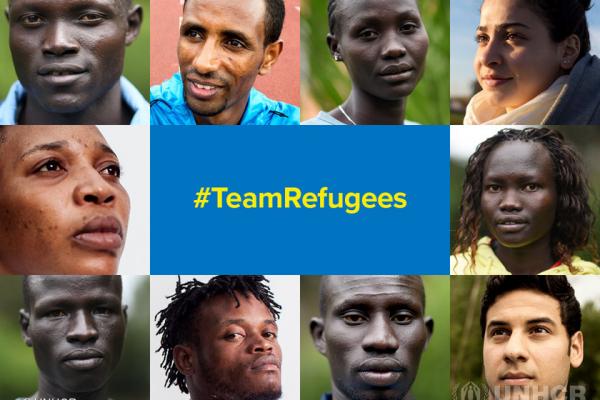This article was made possible by a partnership with Lutheran World Relief, who is solely responsible for its content. To learn more about sponsored content, see Sojourners advertising information.
As the world fixes its attention on the Olympic Games in Rio de Janiero, the residents of the Kakuma Refugee Camp in Kenya will have a special rooting interest.
Living in the camp while displaced from their homeland of South Sudan, their hearts will swell with pride as they watch five of their compatriots compete as part of the first-ever Refugee Olympic Team, which comprises 10 athletes who will march with the Olympic flag in the Opening Ceremony.
The staff of Lutheran World Relief shares that pride, as we have been working in Kakuma since 1998, alongside our partner, Lutheran World Federation. LWR provides food and essential household items, supports primary and secondary education, assists with water supply and warehouse management, and promotes gender equity and human rights.
The Five from Kakuma
Known as the “Five from Kakuma,” these athletes, all middle-distance runners, were chosen out of 36 competitors from Kakuma and the Dadaab Refugee Camp, also in Kenya.
The UN’s refugee agency and the Tegla Loroupe Peace Foundation organized the team in acknowledgement that the world is grappling with the highest levels of displacement on record. According to the UN, an unprecedented 65.3 million people worldwide have been forcibly displaced from their homes. The team also includes athletes from Syria, Ethiopia and the Democratic Republic of the Congo.
“By welcoming the team of Refugee Olympic Athletes to the Olympic Games Rio 2016, we want to send a message of hope for all refugees in our world,” said IOC President Thomas Bach.
The Five from Kakuma include James Nyang Chiengjiek, 28, and Yiech Pur Biel, 21, who will both run the men’s 800 meter event; Rose Nathike Lokonyen, 23, who will compete in the women’s 800 meters; Anjelina Nadai Lohalith, 21, who will run in the women’s 1,500 meter race; and Paulo Amotun Lokoro, 24, who run in the men’s 1,500 meter event.
Parables of Resilience and Hope
Their stories are parables of resilience and hope in the face of overwhelming adversity. James fled his home at age 13 to avoid being kidnapped by rebels seeking child soldiers. Yiech fled the fighting in 2005 and ended up on his own at Kakuma. Rose, who fled her homeland when she was 10, had never run a race until a year ago, when a teacher convinced her to compete in a 10K. She was shocked when she came in second. Angelina says her main motivation is to help her parents, whom she has not seen or heard from since she escaped her village when she was six years old. And Paulo, who just a few years ago was herding his family’s cattle on a southern Sudanese plain, now says his goal is “to be world champion.”
They all know the eyes of the South Sudanese, and the world, will be on them.
“I know I am racing on behalf of refugees,” Paulo told a UNHCR interviewer. “I was one of those refugees there in the camp, and now I have reached somewhere special. I will meet so many people. My people will see me on the television, on Facebook.”
And Yiech hopes to inspire other young refugees, in Kakuma and beyond.
“I can show to my fellow refugees that they have a chance and a hope in life,” he says. “Through education, but also in running, you can change the world.”
Follow these athletes
Lutheran World Relief is tracking these and other athletes from developing nations competing in the Olympics. Follow along at lwr.org



